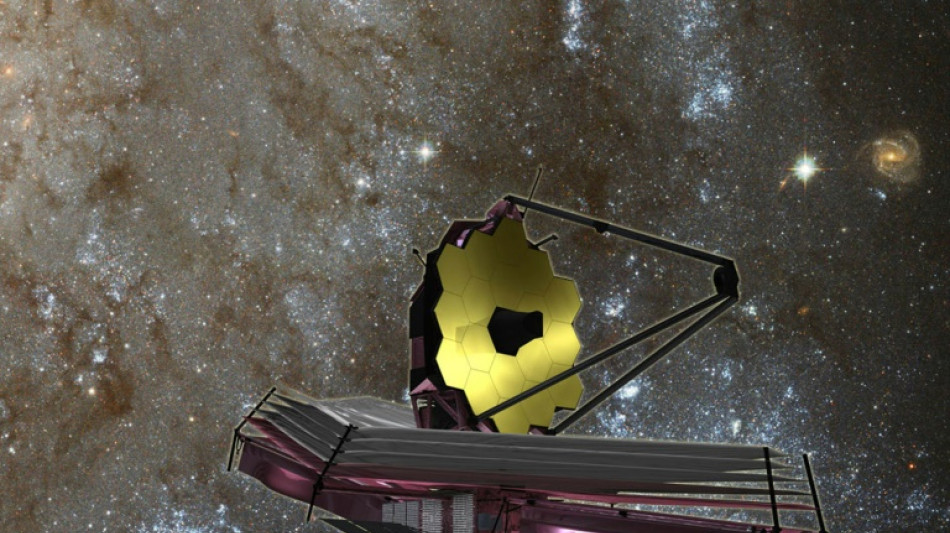
-
 Oil execs work COP29 as NGOs slam lobbyist presence
Oil execs work COP29 as NGOs slam lobbyist presence
-
Gore says climate progress 'won't slow much' because of Trump

-
 'Megaquake' warning hits Japan's growth
'Megaquake' warning hits Japan's growth
-
Stiff business: Berlin startup will freeze your corpse for monthly fee

-
 Wars, looming Trump reign set to dominate G20 summit
Wars, looming Trump reign set to dominate G20 summit
-
Xi, Biden attend Asia-Pacific summit, prepare to meet

-
 Kyrgios to make competitive return at Brisbane next month after injuries
Kyrgios to make competitive return at Brisbane next month after injuries
-
Dominican Juan Luis Guerra triumphs at 25th annual Latin Grammys

-
 Landslide win for Sri Lanka president's leftist coalition in snap polls
Landslide win for Sri Lanka president's leftist coalition in snap polls
-
Australian World Cup penalty hero Vine takes mental health break

-
 As Philippines picks up from Usagi, a fresh storm bears down
As Philippines picks up from Usagi, a fresh storm bears down
-
Tropical Storm Sara pounds Honduras with heavy rain

-
 Pepi gives Pochettino win for USA in Jamaica
Pepi gives Pochettino win for USA in Jamaica
-
'Hell to heaven' as China reignite World Cup hopes with late winner

-
 Rebel attacks keep Indian-run Kashmir on the boil
Rebel attacks keep Indian-run Kashmir on the boil
-
New Zealand challenge 'immense but fantastic' for France

-
 Under pressure England boss Borthwick in Springboks' spotlight
Under pressure England boss Borthwick in Springboks' spotlight
-
All Blacks plan to nullify 'freakish' Dupont, says Lienert-Brown

-
 TikTok makes AI driven ad tool available globally
TikTok makes AI driven ad tool available globally
-
Japan growth slows as new PM readies stimulus

-
 China retail sales pick up speed, beat forecasts in October
China retail sales pick up speed, beat forecasts in October
-
Asian markets fluctuate at end of tough week

-
 Gay, trans people voicing -- and sometimes screaming -- Trump concerns
Gay, trans people voicing -- and sometimes screaming -- Trump concerns
-
Argentina fall in Paraguay, Brazil held in Venezuela

-
 N. Korean leader orders 'mass production' of attack drones
N. Korean leader orders 'mass production' of attack drones
-
Pakistan's policies hazy as it fights smog

-
 Nature pays price for war in Israel's north
Nature pays price for war in Israel's north
-
New Zealand's prolific Williamson back for England Test series

-
 Mexico City youth grapple with growing housing crisis
Mexico City youth grapple with growing housing crisis
-
After Trump's victory, US election falsehoods shift left

-
 Cracks deepen in Canada's pro-immigration 'consensus'
Cracks deepen in Canada's pro-immigration 'consensus'
-
Xi inaugurates South America's first Chinese-funded port in Peru

-
 Tyson slaps Paul in final face-off before Netflix bout
Tyson slaps Paul in final face-off before Netflix bout
-
England wrap-up T20 series win over West Indies

-
 Stewards intervene to stop Israel, France football fans clash at Paris match
Stewards intervene to stop Israel, France football fans clash at Paris match
-
Special counsel hits pause on Trump documents case

-
 Japan's Princess Mikasa, great aunt to emperor, dies aged 101
Japan's Princess Mikasa, great aunt to emperor, dies aged 101
-
Cricket at 2028 Olympics could be held outside Los Angeles

-
 Trump names vaccine skeptic RFK Jr. to head health dept
Trump names vaccine skeptic RFK Jr. to head health dept
-
Ye claims 'Jews' controlling Kardashian clan: lawsuit

-
 Japan into BJK Cup quarter-finals as Slovakia stun USA
Japan into BJK Cup quarter-finals as Slovakia stun USA
-
Sri Lanka president's party headed for landslide: early results

-
 Olympics 'above politics' say LA 2028 organisers after Trump win
Olympics 'above politics' say LA 2028 organisers after Trump win
-
Panic strikes Port-au-Prince as residents flee gang violence

-
 Carsley hails England's strength in depth as understudies sink Greece
Carsley hails England's strength in depth as understudies sink Greece
-
Undefeated Chiefs lose kicker Butker to knee injury

-
 Wallabies winger Vunivalu signs for La Rochelle
Wallabies winger Vunivalu signs for La Rochelle
-
Musk met Iran UN ambassador on defusing tension under Trump: NYT

-
 Vinicius misses penalty as Brazil held in Venezuela
Vinicius misses penalty as Brazil held in Venezuela
-
World's tallest teen Rioux won't make college debut until 2025

| RBGPF | 100% | 61.84 | $ | |
| SCS | -0.75% | 13.27 | $ | |
| RYCEF | -4.71% | 6.79 | $ | |
| NGG | 0.4% | 62.37 | $ | |
| CMSC | -0.24% | 24.55 | $ | |
| GSK | -2.09% | 34.39 | $ | |
| RELX | -0.37% | 45.95 | $ | |
| VOD | -0.81% | 8.68 | $ | |
| BP | 1.65% | 29.05 | $ | |
| BTI | 0.2% | 35.49 | $ | |
| BCC | -1.57% | 140.35 | $ | |
| JRI | -0.23% | 13.21 | $ | |
| RIO | -0.31% | 60.43 | $ | |
| CMSD | -0.02% | 24.725 | $ | |
| BCE | -1.38% | 26.84 | $ | |
| AZN | -0.38% | 65.04 | $ |

Webb spots surprisingly massive galaxies in early universe
The James Webb Space Telescope has spotted six massive galaxies that emerged not long after the Big Bang, a study said Wednesday, surprising scientists by forming at a speed that contradicts our current understanding of the universe.
Since becoming operational last July, the Webb telescope has been peering farther than ever before into the universe's distant reaches -- which also means it is looking back in time.
For its latest discovery, the telescope spied galaxies from between 500 to 700 years million years after the Big Bang 13.8 billion years ago, meaning the universe was under five percent of its current age.
Webb's NIRCam instrument, which operates in the near infrared wavelength invisible to the naked eye, observed the six galaxies in a little-known region of the sky, according to a study published in the journal Nature.
Two of the galaxies had previously been spotted by the Hubble Space Telescope but were so faint in those images that they went unnoticed.
These six new "candidate galaxies", so-called because their discovery still needs to be confirmed by other measurements, contain many more stars than scientists expected.
One galaxy is even believed to have around 100 billion stars.
That would make it around the size of the Milky Way, which is "crazy," the study's first author Ivo Labbe told AFP.
- 'Off a cliff' -
It took our home galaxy the entire life of the universe for all its stars to assemble.
For this young galaxy to achieve the same growth in just 700 million years, it would have had to grow around 20 times faster than the Milky Way, said Labbe, a researcher at Australia's Swinburne University of Technology.
For there to be such massive galaxies so soon after the Big Bang goes against the current cosmological model which represents science's best understanding of how the universe works.
"According to theory, galaxies grow slowly from very small beginnings at early times," Labbe said, adding that such galaxies were expected to be between 10 to 100 times smaller.
But the size of these galaxies "really go off a cliff," he said.
What could be going on? One suspect is mysterious dark matter, which makes up a sizeable amount of the Universe.
While much about dark matter remains unknown, scientists believe it plays a key role in the formation of galaxies.
When dark matter "clumps" together into a halo, it attracts gas from the surrounding universe which in turn forms a galaxy and its stars, Labbe said.
But this process is supposed to take a long time, and "in the early universe, there's just not that many clumps of dark matter," he said.
- 'Model is cracking' -
The newly discovered galaxies could indicate that things sped up far faster in the early universe than previously thought, allowing stars to form "much more efficiently," said David Elbaz, an astrophysicist at the French Atomic Energy Commission not involved in the research.
This could be linked to recent signs that the universe itself is expanding faster than we once believed, he added.
This subject sparks fierce debate among cosmologists, making this latest discovery "all the more exciting, because it is one more indication that the model is cracking," Elbaz said.
Elbaz is one of many scientists working on the European Space Agency's Euclid space telescope, which is scheduled to launch in July to join Webb in space.
Euclid's mission is to uncover the secrets of dark matter and dark energy -- and it could also help solve this latest mystery, Elbaz said.
Labbe referred to the "black swan theory", under which just one unexpected event can overturn our previous understanding -- such as when Europeans saw the first black swans in Australia.
He called the galaxies "six black swans -- if even one of them turns out to be true, then it means we have to change our theories."
Y.Kobayashi--AMWN


